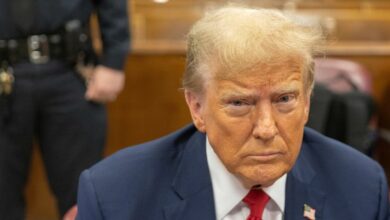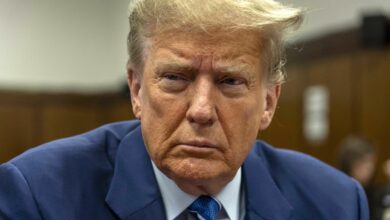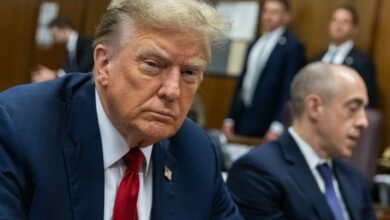As people around Egypt watched the second day of the history-making trial of former President Hosni Mubarak on television screens in their homes and offices, a small but dedicated viewing party was also being held under the baking sun outside of the Police Academy where the trial was being held on the desert outskirts of Cairo, with both supporters and opponents of the fallen president cheering at times and, at other times, violently clashing with each other thoughout the day.
Hundreds of Mubarak supporters lined up starting early in the morning to lend their support to the deposed autocrat, whom they still revere as a father figure.
“We are the sons of Mubarak. I am standing here today in the sun while fasting to say a word of truth in support of Mubarak,” said Nermeen Ibrahim, 21, who wore a t-shirt reading: “I am Egyptian and I refuse to insult the leader of the nation.
“These people who don't know anything about his history and achievements are ignorant. They don't know the meaning of freedom,” Ibrahim said of the smaller group who came out to cheer on the prosecution.
Only a few dozen anti-Mubarak protesters arrived, largely comprised of families of people killed during the 18-day uprising that brought down the president. It is their murders for which Mubarak could now be facing the death penalty as the trial unfolds.
The protesters showed their distaste for Mubarak by placing a portrait of the former president on the ground and having people walk over it.
“The people demand the execution of Mubarak,” the crowd chanted, echoing one of the most popular refrains of the uprising.
“Mubarak is a killer and he has the blood of millions on his hands,” said Mohamed Zahran, 38, whose nephew Ali Hassan Zahran was killed during the protests. Zahran, like many of the other anti-Mubarak demonstrators, accused the Mubarak supporters of being paid for their services. (The pro-Mubarak protesters, naturally, denied this.)
Both sides had occasion to celebrate when Ahmed Refaat, the presiding judge, issued a series of short rulings before adjourning the case until 5 September.
Those hoping to see serious charges against the former president rejoiced when Refaat issued his rulings. When the judge announced that Mubarak’s case on charges of conspiracy to murder would be joined to that of former Interior Minister Habib el-Adly, the martyrs’ families broke out in chants of “God is great!"
The joining of the two cases is widely seen as a move that will aid in a swifter prosecution of Mubarak on murder charges.
However, the joyful mood of the martyr's families was deflated by the announcement that the trial would no longer be broadcast live on television.
The same announcement caused the Mubarak supporters to cheer for their “beloved leader”. During the two sessions of the trial so far, Mubarak has appeared lying down on a hospital bed inside a cage in the courtroom.
“Illegitimate!” chanted the families of the martyrs. “The people demand the purging of the judiciary.” They held their shoes up to the screen showing the trial.
“The whole world has to listen to the testimonies,” said Abdel Kereem Ibrahim, 24, whose brother, Mostafa, was shot dead on 28 January in front of Marg police station.
‘This proves that they were just pacifying us by showing us Mubarak in a cage, but when it started to become serious, they changed their minds,” he said.
Gomaa Ali, a lawyer, however, disagreed that end of live broadcasts was a setback. “These people are unaware of the legal procedures. Stopping the broadcasting of testimonies will prevent anyone from changing their testimony according to the others,” said Ali.
The Mubarak supporters, meanwhile, gladly welcomed the court’s announcement.
“We will celebrate this decision. We don’t want the whole world to see these scenes of Mubarak in this state inside the cage again. It is humiliating,” said Tamer Nasser, a pro-Mubarak online activist.




